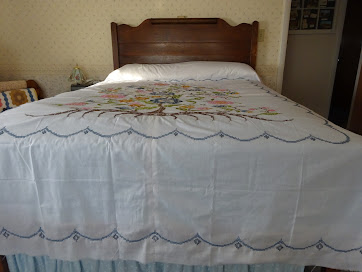As we were singing in church Sunday morning, I suddenly noticed the song was written in 1723 by Nicholas Ludwig von Zinzendorf. "Heart With Loving Heart United" is a Moravian hymn! What is it doing in a Mennonite hymnbook? Why not? We also have a Lutheran hymn, "A Mighty Fortress," written by Martin Luther and a Catholic hymn, "Holy God We Praise Thy Name."
When I thought about the words of Zinzendorf's hymn, I could see the Moravian theology in it. The Moravians stressed community and brotherhood. The four leading Moravian communities of Bethlehem, Emmaus, Nazareth, and Lititz were founded in the 1700s and located in eastern Pennsylvania. They were not Anabaptist as they practiced infant baptism, but they shared some of the Mennonite beliefs in nonresistance and non-swearing of oaths. Zinzendorf was the most influential leader of the Moravians.
Nicholas von Zinzendorf was born into a noble family in 1700. His father died when he was an infant, and he was raised at Gros Hennersdorf, the castle of his influential Pitetistic grandmother. Zinzendorf married a cousin, Erdmuth Dorothea von Reuss, and assumed his duties as a young noble in the court of King August the Strong.
In 1722, he was approached by a group of Moravians who requested permission to live on his lands. He granted their request, and a small band crossed the border from Moravia to settle in a town they called Herrnhut. Zinzendorf was intrigued by the story of the Moravians. A few years later he left public life and began spending all his time working with the troubled group of Moravians. Largely due to his leadership, the group came to formulate a unique document, known as the "Brotherly Agreement," which set forth basic tenets of Christian behavior. They experienced a revival, and the Moravian church was firmly established.
Zinzendorf believed that salvation was a matter of the heart and not merely an intellectual assent to certain principals or following prescribed liturgy in worship services. He also focused on missionary outreach with an ecumenical idea of uniting existing denominations. The Moravians sent missionaries from Greenland to South America as well as to Native Americans during Zinzendorf'a lifetime. They established schools and emphasized music. During the Revolutionary War, the Brother House in Lititz housed wounded soldiers who were cared for by members of the community.
In later years, the Moravians lost their nonresistant beliefs, distinctive dress, and other unique beliefs. They were basically acclimated to the dominate culture. They are still known for some distinctive traditions such as the Moravian Star, putz (nativity scene), and music. The archives at Bethlehem preserves an extensive collection of Moravian music.
Here are the words of Zinzendorf's hymn written in 1723, soon after he became acquainted with the Moravians.
Heart with loving heart united,
Met to know God's holy will,
Let His love in us ignited,
More and more our spirits fill,
He the head, we are His members;
We reflect the light He is.
He the Master, we the brothers,
He is ours and we are His.
May we all so love each other,
And all selfish claims deny,
That the brother for the brother
Will not hesitate to die.
Even so our Lord has loved us;
For our lives He shed His blood.
Still He grieves and still He suffers
When we mar the brotherhood.
Since, O Lord, You have demanded
That our lives Your love should show,
So we wait to be commanded
Forth into Your world to go.
Kindle in us love's compassion
So that everyone may see
In our fellowship the promise
Of the new humanity.
Moravian Star


